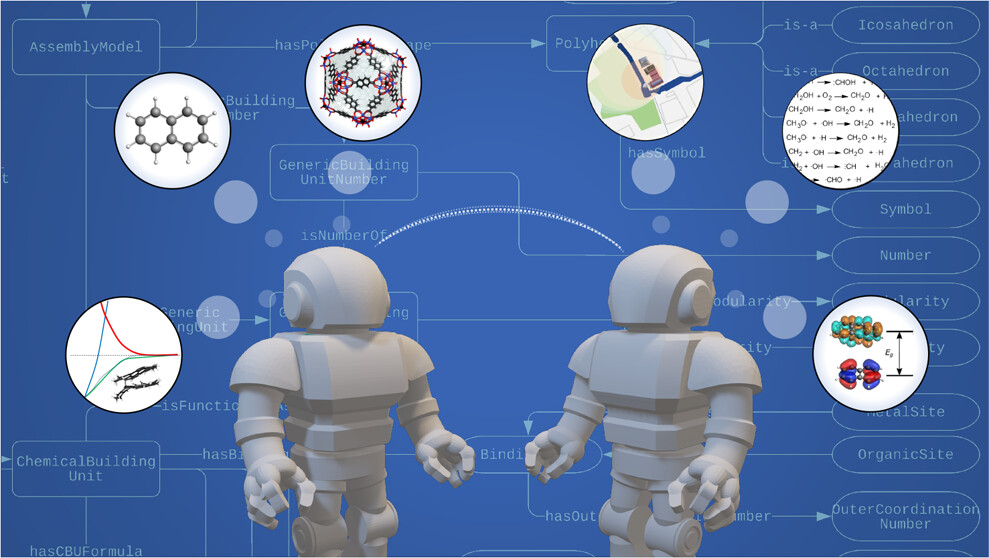Knowledge Engineering in Chemistry: From Expert Systems to Agents of Creation
- Knowledge engineering (KE) is a branch of Artificial Intelligence (AI) that emulates the decision-making process of a human expert.
- In a KE approach, instances of knowledge are semantically described with the help of ontologies.
- Software agents are used to facilitate reasoning and execution of various operations.
- KE in chemistry covers many areas, such as rational design, multiscale modelling, lab automation and others.
- Broad chemical knowledge ecosystems are developed through multidisciplinary knowledge graphs.
 Passing knowledge from human to human is a natural process that has continued since the beginning of humankind. Over the past few decades, we have witnessed that knowledge is no longer passed only between humans but also from humans to machines. The latter form of knowledge transfer represents a cornerstone in artificial intelligence (AI) and lays the foundation for knowledge engineering (KE). In order to pass knowledge to machines, humans need to structure, formalize, and make knowledge machine-readable. Subsequently, humans also need to develop software that emulates their decision-making process. In order to engineer chemical knowledge, chemists are often required to challenge their understanding of chemistry and thinking processes, which may help improve the structure of chemical knowledge.
Knowledge engineering in chemistry dates from the development of expert systems that emulated the thinking process of analytical and organic chemists. Since then, many different expert systems employing rather limited knowledge bases have been developed, solving problems in retrosynthesis, analytical chemistry, chemical risk assessment, etc. However, toward the end of the 20th century, the AI winters slowed down the development of expert systems for chemistry. At the same time, the increasing complexity of chemical research, alongside the limitations of the available computing tools, made it difficult for many chemistry expert systems to keep pace.
In the past two decades, the semantic web, the popularization of object-oriented programming, and the increase in computational power have revitalized knowledge engineering. Knowledge formalization through ontologies has become commonplace, triggering the subsequent development of knowledge graphs and cognitive software agents. These tools enable the possibility of interoperability, enabling the representation of more complex systems, inference capabilities, and the synthesis of new knowledge.
This Account introduces the history, the core principles of KE, and its applications within the broad realm of chemical research and engineering. In this regard, we first discuss how chemical knowledge is formalized and how a chemist’s cognition can be emulated with the help of reasoning algorithms. Following this, we discuss various applications of knowledge graph and agent technology used to solve problems in chemistry related to molecular engineering, chemical mechanisms, multiscale modeling, automation of calculations and experiments, and chemist–machine interactions. These developments are discussed in the context of a universal and dynamic knowledge ecosystem, referred to as The World Avatar (TWA).
Passing knowledge from human to human is a natural process that has continued since the beginning of humankind. Over the past few decades, we have witnessed that knowledge is no longer passed only between humans but also from humans to machines. The latter form of knowledge transfer represents a cornerstone in artificial intelligence (AI) and lays the foundation for knowledge engineering (KE). In order to pass knowledge to machines, humans need to structure, formalize, and make knowledge machine-readable. Subsequently, humans also need to develop software that emulates their decision-making process. In order to engineer chemical knowledge, chemists are often required to challenge their understanding of chemistry and thinking processes, which may help improve the structure of chemical knowledge.
Knowledge engineering in chemistry dates from the development of expert systems that emulated the thinking process of analytical and organic chemists. Since then, many different expert systems employing rather limited knowledge bases have been developed, solving problems in retrosynthesis, analytical chemistry, chemical risk assessment, etc. However, toward the end of the 20th century, the AI winters slowed down the development of expert systems for chemistry. At the same time, the increasing complexity of chemical research, alongside the limitations of the available computing tools, made it difficult for many chemistry expert systems to keep pace.
In the past two decades, the semantic web, the popularization of object-oriented programming, and the increase in computational power have revitalized knowledge engineering. Knowledge formalization through ontologies has become commonplace, triggering the subsequent development of knowledge graphs and cognitive software agents. These tools enable the possibility of interoperability, enabling the representation of more complex systems, inference capabilities, and the synthesis of new knowledge.
This Account introduces the history, the core principles of KE, and its applications within the broad realm of chemical research and engineering. In this regard, we first discuss how chemical knowledge is formalized and how a chemist’s cognition can be emulated with the help of reasoning algorithms. Following this, we discuss various applications of knowledge graph and agent technology used to solve problems in chemistry related to molecular engineering, chemical mechanisms, multiscale modeling, automation of calculations and experiments, and chemist–machine interactions. These developments are discussed in the context of a universal and dynamic knowledge ecosystem, referred to as The World Avatar (TWA).
- This paper draws from preprint 300: Knowledge Engineering in Chemistry: From Expert Systems to Agents of Creation
- Access the article at the publisher: DOI: 10.1021/acs.accounts.2c00617



